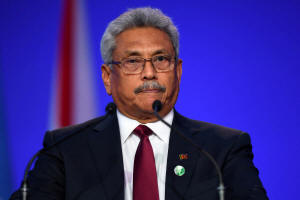|
The
Straits Times reported that Rajapaksa boarded a flight from
Singapore to Bangkok on Thursday evening after the country's
Immigration and Checkpoints Authority said in a statement that
he had left Singapore.
Rajapaksa is expected to stay temporarily in Thailand, a second
Southeast Asian country since he fled Sri Lanka for Singapore on
July 14 and resigned from office shortly afterwards, following
unprecedented unrest over his government's handling of the worst
economic crisis in seven decades, and days after thousands of
protesters stormed the president's official residence and
office.
The former military officer, who is the first Sri Lankan head of
state to quit mid-term, is expected to travel from Singapore to
Thailand's capital of Bangkok on Thursday, two sources said. It
was unclear what time he would arrive.
Thai authorities said Rajapaksa had no intention of seeking
political asylum and would only stay temporarily.
"This is a humanitarian issue and there is an agreement that
it's a temporary stay," Prime Minister Prayuth Chan-ocha told
reporters on Wednesday.
Prayuth also said Rajapaksa could not participate in any
political activities while in Thailand.
Foreign Minister Don Pramudwinai said the current Sri Lankan
government supported Rajapaksa's trip to Thailand, adding that
the former president's diplomatic passport would allow him to
stay for 90 days.
Rajapaksa has made no public appearances or comment since
leaving Sri Lanka, and Reuters was not able to immediately
contact him.
Sri Lanka's economic crisis is a result of several factors
including COVID-19, which battered its tourism-reliant economy
and slashed remittances from workers overseas, rising oil
prices, populist tax cuts and a seven-month ban on the import of
chemical fertilisers last year that devastated agriculture.
(Reporting by Panu Wongcha-um in BANGKOK, Chen Lin in Singapore;
Editing by Kanupriya Kapoor and Robert Birsel)
[© 2022 Thomson Reuters. All rights
reserved.] Copyright 2022 Reuters. All rights reserved. This material may not be published,
broadcast, rewritten or redistributed.
Thompson Reuters is solely responsible for this content.

|
|




